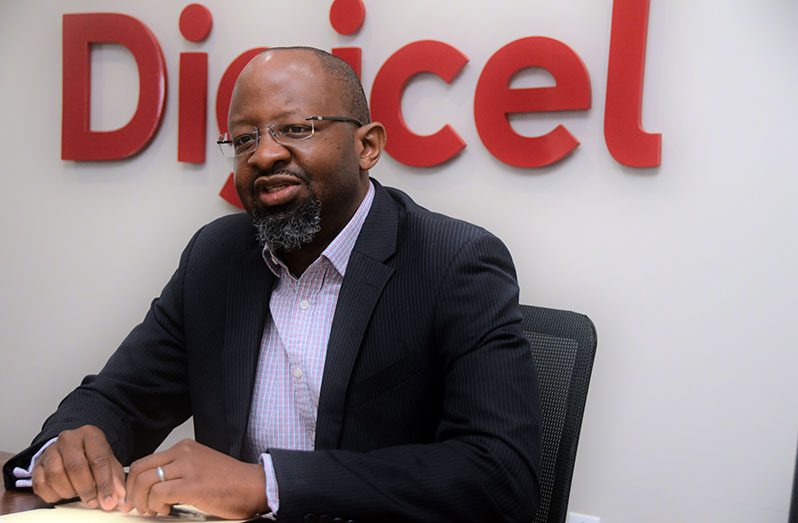DIGICEL is currently in discussions with government to get the necessary approvals to provide fixed and landline residential services ahead of the landing of its subsea fibre optic cable, which is on track to be completed in early 2024.
Giving an update on how the company is moving forward to capitalise on Guyana’s liberalised telecommunications sector, the company’s Chief Executive Officer (CEO), Gregory Dean, in an interview on Tuesday, explained that Digicel is engaging government with regards to its plans to expand its line of services.
“Both in terms of the residential business and spectrum, we are still engaged in discussions with the government, in terms of having adequate spectrum and also the necessary permission to offer residential services,” Dean related
Asked how soon the company would be looking to roll out services, Dean said: “In terms of timeline, we are quite hopeful that most of the information that has been requested has been provided [to the government] and we are hopeful that by the end of this month or next month we will have a lot of those issues resolved and I would say once those things are resolved we can look at within 12 months having services supplied to customers.”
Operating in Guyana since 2007 as a mobile service provider, Digicel, over the years has been a big advocate for the liberalisation of Guyana’s telecommunications sector, which was being held in a monopoly by the Guyana Telephone and Telegraph Company (GTT).
“The key thing that liberalisation gives us is certainty, because as investors, what you’re looking for is certainty. Because the rules allow you to keep investing and keep going,” Dean noted.
The telecommunications sector was finally liberalised in October 2020, and in September 2021, Digicel announced that it had signed a partnership agreement with Orange to extend the build of its Deep Blue One subsea cable and system to provide connectivity to French Guiana, Suriname, Guyana and Trinidad.
With the cable, Digicel will now be able to provide other services outside of its mobile service.
“One of the reasons for the subsea fibre is to turn us into a full-service communications provider. We have had an ISP [Internet Service Provider] permission for some years with limited internet provisions to businesses but we are looking to build that out and get into residential and businesses [services] and be a full provider of all communication services as well,” Dean explained.
Notwithstanding that the company, like many others, have faced challenges over the past year due to the COVID-19 pandemic, Dean noted that the fibre optic project remains on track.
“Currently we are working with multiple partners on the project. Definitely we’re going to have it landed in Guyana and operational by early 2024. We are hoping with the arrival of the subsea fibre we will have improved capacity in the country and also, we will have redundancy because you know that you already have to substitute fibre here,” Dean added.
When Digicel’s fibre optic cable arrives, it will join fibre optic cables that have already been landed here by GTT and ENetworks, which are both currently providing fibre optic internet and other services.
With these providers already expanding their provision across the country, Dean said Digicel is in no way daunted by the competition and believes that the company’s commitment to quality service will attract customers.
“From a promotional point of view and a marketing point of view we will be hoping to have the best product out there. So people can expect us to approach all of these similarly to the way we approach the mobile business when we entered the markets and how we have continued to develop our mobile business. I think customers and the public can expect us to do a lot of the same things in all of the new areas that we are going to go into,” Dean said.



.jpg)











